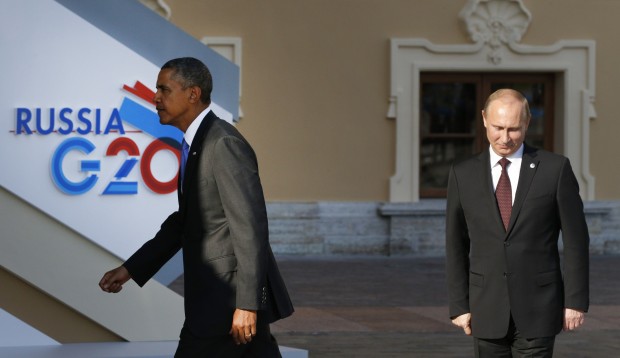
US President Barack Obama, left, walks away after shaking hands with Russia’s President Vladimir Putin, right, during arrivals for the G-20 summit at the Konstantin Palace in St. Petersburg, Russia on Thursday, Sept. 5, 2013. (AP Photo/Alexander Zemlianichenko)
London, Asharq Al-Awsat—World leaders appeared no closer to reaching an agreement on the Syria crisis on Friday, the final day of the G20 summit, as international parties remained divided over a possible US “punitive” military strike against the Assad regime for its alleged use of chemical weapons.
US President Obama appeared increasingly isolated at a summit of the Group of 20 leading world economies in St. Petersburg, with Russia, China, the European Union, the BRICS emerging economies, and the UN Secretary-Genera, all warning of the dangers of military intervention in Syria without UN approval.
During a summit dinner hosted by Russian President Vladimir Putin on Thursday evening, the majority of world leaders said they were not in favor of any punitive action against Syria for its alleged use of chemical weapons unless it was first agreed by the UN Security Council.
UN Secretary-General Ban Ki-moon told leaders attending the event that any military action against Syria must have Security Council backing.
He said: “Let us remember: every day that we lose is a day when scores of innocent civilians die,” adding, “There is no military solution.”
Italian Prime Minister Enrico Letta confirmed the international split over possible military action in Syria. In a tweet posted on Thursday evening, he said: “The G20 has just now finished the dinner session, at which the divisions about Syria were confirmed.”
US President Barack Obama and French President Francois Hollande have been lobbying world leaders to accept evidence that the Assad regime was behind the deadly chemical attack on Damascus’s eastern Ghouta district, which the White House claims killed more than 1,400 people. Russia has rejected Washington’s position, calling for further investigation into the attack, while the Assad regime contends that the Syrian rebels were responsible.
Russian President Putin has also stressed that any military strike outside of the framework of the UN Security Council would be illegal.
“According to current international law, only the United Nations Security Council can sanction the use of force against a sovereign state. Any other approaches, means, to justify the use of force against an independent and sovereign state, are inadmissible,” Putin told Russia’s First Channel prior to the G20 summit.
Speaking on the sidelines of the summit, a spokesman for the Russian president said that a US military strike on Syria would “drive another nail into the coffin of international law.”
In the same interview, Putin said Russia did not rule out approving military action against Syria if clear evidence showed Damascus had carried out chemical weapons attacks. However UK Prime Minister David Cameron expressed skepticism that Putin could be persuaded by any evidence that the Ghouta chemical weapons attack was launched by government forces. Cameron revealed that during the G20 summit, Putin “said to me he would like to see further evidence of regime culpability and we will go on providing him evidence, but I think it will take a lot to change his mind.”
In New York, US Ambassador to the UN, Samantha Power, left little doubt that Washington has now given up trying to work with the UN Security Council.
She said there was “no viable path forward in this Security Council,” accusing Russia of holding it hostage.
“Even in the wake of the flagrant shattering of the international norm against chemical weapons use, Russia continues to hold the council hostage and shirk its international responsibilities,” she said.
Power added, “What we have learned, what the Syrian people have learned, is that the Security Council the world needs to deal with this crisis is not the Security Council we have.”
